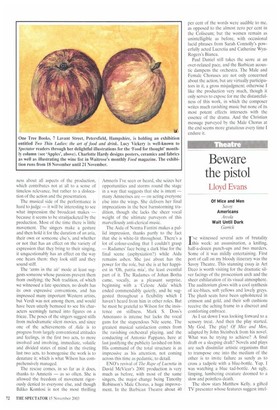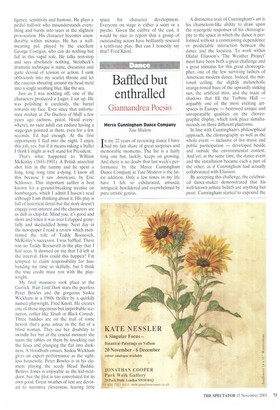Beware the pistol
Lloyd Evans
Of Mice and Men Savoy Americans Arcola Walt Until Dark Ganick
I've witnessed several acts of brutality
this week: an assassination, a knifing, half-a-dozen punch-ups and two murders. Some of it was mildly entertaining. First port of call on my bloody itinerary was the Savoy Theatre. This stunning essay in Art Deco is worth visiting for the dramatic silver facings of the proscenium arch and the sheer exhilaration of its visual atmosphere. The auditorium glows with a cool synthesis of ice-blues, soft yellows and lovely greys. The plush seats have been upholstered in crimson and gold, and their soft cushions receive the aching frame in a discreet and comforting embrace.
As I sat down I was looking forward to a sensory treat. And then the play started. My God. The play! Of Mice and Men, adapted by John Steinbeck from his novel. What was he trying to achieve? A final draft or a sleeping draft? Novels and plays are such dissimilar artistic organisms that to transpose one into the medium of the other is to invite failure as surely as to cross a tadpole with a blue-bottle. Yup. I was watching a blue tad-bottle. An ugly, limping, lumbering creature doomed to a slow and pointless death.
The show stars Matthew Kelly, a gifted TV presenter whose features suggest intel ligence, sensitivity and humour, He plays a pitiful half-wit who misunderstands everything and bursts into tears at the slightest provocation. His character becomes unendurable within minutes. He has a wellmeaning pal, played by the excellent George Costigan, who can do nothing but fail in this vapid role. He talks non-stop and says absolutely nothing. Steinbeck's dramatic technique is static, discursive and quite devoid of tension or action. I sank obliviously into my scarlet throne and let the raucous shouting around my head meld into a single soothing blur, like the sea.
Just as I was nodding off, one of the characters produced a Luger. I sat up. He was polishing it carelessly, the barrel towards my face. Ever since that unfortunate mishap at The Duchess of Malfi a few years ago (actress, pistol, blood everywhere), no sane adult can endure having a stage-gun pointed at them, even for a few seconds. I'd had enough_ At the first opportunity I fled into the night. I enjoy this job, yes, but if it means taking a bullet I think I might as well stand for President.
That's what happened to William McKinley (1843-1901). A Polish anarchist shot him in the tummy and he spent a long, long, long time a-dying. I know all this because I saw Americans, by Eric Schlosser. This important author is best known for a ground-breaking treatise on hamburgers, which I admit I haven't read although I am thinking about it. His play is full of historical detail but the story doesn't engage your interest and the characters are as dull as chip-fat. Mind you, it's good and short and when it was over I clapped gratefully and skedaddled home. Next day in the newspaper I read a review which mentioned the role of Teddy Roosevelt, McKinley's successor. 1 was baffled. There was no Teddy Roosevelt in the play that I had seen. It dawned on me that I'd left at the interval. How could this happen? I'm tempted to claim responsibility for husbanding my time so skilfully, but I think the true credit must rest with the playwright.
My final massacre took place at the Garrick. Wait Until Dark stars the peerless Peter Bowles and the gorgeous Saskia Wickham in a 1960s thriller by a quirkily named playwright, Fred Knott. He creates one of those ingenious but improbable scenarios, rather like Sleuth or Black Comedy. Three baddies are on the trail of some heroin that's gone astray in the flat of a blind woman. They use her disability to swindle her but at the crucial moment she turns the tables on them by knocking out the fuses and plunging the flat into darkness. A bloodbath ensues. Saskia Wickham gives an expert performance as the sightless housewife. Peter Bowles is in his element playing the seedy Head Baddie. Bettrys Jones is enjoyable as the kid-nextdoor, but the plot is too convoluted for its own good. Great swathes of text are devoted to narrative cleverness, leaving little space for character development. Everyone on stage is either a saint or a psycho. Given the calibre of the cast, it would be nice to report that a group of outstanding actors have brilliantly rescued a tenth-rate play. But can I honestly say that? Fred Knott.



























































































 Previous page
Previous page